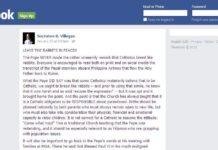THE NEW year seeks to mark improved relations between leaders of different faiths.
This is what inter-religious dialogue leaders vow to prioritize even after the ceremonial handshakes and photo ops with Pope Francis on Jan. 18.
Ten leaders representing different religions and denominations are set to meet Pope Francis at the University’s Arch of the Centuries.
One representative of the academe in the inter-religious dialogue, Lilian Sison, former dean of the UST Graduate School, said the fleeting personal encounter between Pope Francis and the religious leaders is an opportunity to learn more about “respect and peace.”
Sison said “unity” among religions is the main point of the encounter with the Pope.
“Inter-religious dialogue is an instrument for peace building. In conflict areas around the world, some use religion as an excuse. The people need to know how to work together despite difference in faith,” she said.
Sison added that she is happy her work in inter-religious dialogue is one that is supported by the Vatican.
Having met Popes John Paul II and Benedict XVI in the past, Sison said meeting the Pope is something she will not get used to.
“You just feel mesmerized when you are in front of him. It’s like you see a halo around his head and then parang natulala ka na lang eh,” Sison recalled.
Seeing the Pope made Sison realize how blessed she was as a person.
“No matter how short the encounter is, the fact that you are upclose and personal with him, it is already a very blessed event.”
Being the only woman in the roster of leaders, Sison has more than her fair share of local and international feats in the field of interfaith dialogue. These include her being the secretary-general of the Religions for Peace Philippines since 2008 and director of the University’s International Relations and Programs Office in 2014. However, Sison said she still would like to ask for a blessing from the Pope to be able to continue her work.
“I would just like to ask him for blessing that I may be able to complete my work, to be motivated to work for the common good and be able to make a difference in the communities I serve,” she said.
Sison reminded that the challenge after the Pope leaves is for everyone to go out of their comfort zones in knowing and understanding other people of different religion.
“We have to open our hearts to people of other faiths so that we could work towards the common good. The way I see it, sometimes when we see Muslims, there is already a negative connotation. It shouldn’t be that way, they are persons too,” she said. “What happens when the ASEAN integration starts, Christians are a minority then. We are on the losing end if we do not improve our cultural quotient.”
A Church leader who will meet the 78-year-old-pontiff, Iglesia Filipina Independiente (IFI) Supreme Bishop Ephraim Fajutagana echoed Sison, saying feelings of animosity should stop not only among the flock but also among the shepherds.
Fajutagana said he hopes the visit of Pope Francis will bring about a new mindset to religious leaders who are fond of bickering with one another over other denominations.
“I hope we let go of all the fighting. Let us work together rather than bash each other in TV or radio stations. We preach about understanding and healing so let us practice it within ourselves,” Fajutagana said.
The Aglipayan Church leader, who is in his third year as the leader of the IFI (Philippine Independent Church), shared that he was surprised after being informed of his involvement in the dialogue with the Pope but he feels honored to receive the historical invitation.
“I feel very honored and privileged considering that IFI is not very popular to the Pope but thanks to our friends from the Roman Catholic, we are given an opportunity like this,” Fajutagana said.
If by some chance, the 15-minute meet and greet turns into a long indoor discussion, Fajutagana hopes to bring up issues on strengthening the bond between Philippine Churches in order to avoid “crises” in the country such as human trafficking, injustice, poverty and corruption.
“To be able to apply and practice the acts of mercy and compassion, even after the Pope returns to Vatican, will be the ultimate accomplishment,” said Fajutagana.
“I do hope that whatever we would be able to talk about in the meeting and after, it will bear fruit. I hope that there is practice not only on the part of the people, of government officials but also for the Church leaders,” he added.
Despite spearheading efforts in relief distribution in typhoon-stricken areas and conducting stress management and counseling to schools in Mindanao, Fajutagana vows to be more active in visiting people in the far-off areas of the Philippines as much as he can.
“Pope Francis shows service through his visits. I would also like to further reach out and visit. These visits are not in the well-off parishes but in the areas where no one hardly visits.” Danielle Ann F. Gabriel and Marie Danielle M. Macalino










